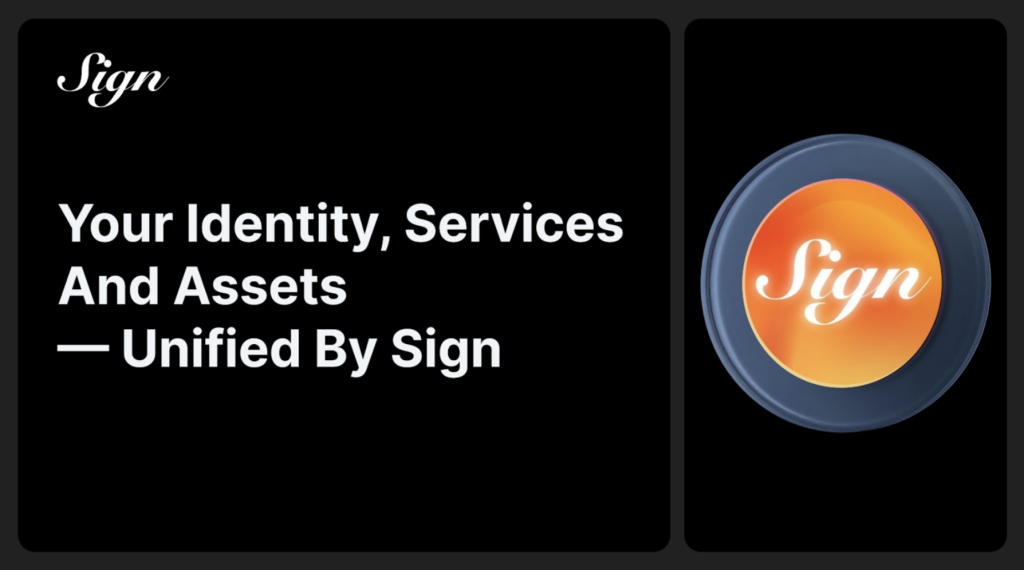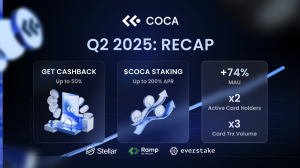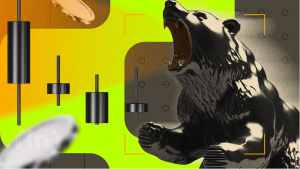Your Identity, Services, and Assets — Unified by Sign

Editorial Note: The following content does not reflect the views or opinions of BeInCrypto. It is provided for informational purposes only and should not be interpreted as financial advice. Please conduct your own research before making any investment decisions.
As the digital tide accelerates, the way the world operates is being redefined almost daily. The boundaries between identity, data, and assets are increasingly blurred. Web3 is giving back the right to define “trust” in the hands of individuals, away from centralized institutions.
But this transformation brings challenges: replicating real-world identity verification, asset distribution, and regulatory frameworks on chain is far from simple. Fragmented data, lack of standardized protocols, and high compliance costs have become a “glass ceiling” impeding global coordination.
To shatter this ceiling, we need a universally accepted trust infrastructure—one that can be embraced by sovereign nations, multinational enterprises, and Web3-native communities alike. This is exactly what Sign Protocol is building:
Sovereign-grade identity: With Sign Protocol, official credentials like passports and visas can be securely attested on chain, enabling governments to unlock the potential of digital public services within regulatory frameworks.
TokenTable standard: Complex token issuance, unlocking, and distribution processes are made modular and template-based, allowing companies and projects to issue tokens with API-like simplicity, while maintaining regulatory traceability.
In short, Sign aims to unify “who you are” and “what you own” into a single on chain standard, creating a frictionless, secure, and scalable infrastructure for individuals, enterprises, and governments to operate at full speed on the same digital highway.
Project Overview: What Problems Is Sign Addressing?
Project Summary
Sign is actively participating in multiple national-level digital infrastructure projects, with deployments in the UAE, Thailand, and Sierra Leone. Its expansion plans encompass over 20 countries and regions, including emerging digital governance hubs like Barbados and Singapore.
In terms of product metrics, the number of credential templates in Sign Protocol has grown exponentially. The TokenTable platform has distributed over $4 billion, covering more than 40 million on chain wallet addresses and serving over 200 projects, including major ecosystems like Starknet, ZetaChain and Notcoin.
Capital markets are gradually recognizing its value. Sequoia Capital has taken part in the investment across the region, and YZi Labs led subsequent funding rounds. Sign has achieved $15 million in annual revenue, making it one of the few identity verfication and asset distribution infrastructure projects with a viable income model, showcasing strong market competitiveness and growth potential.
Project Vision
Sign introduces the concept of a “supranational database”, aiming to create a globally verifiable and auditable information structure through blockchain technology. Sign seeks to provide a programmable foundation for digital identity verification, token logic standardization, and trustworthy data transmission, promoting the integration of on chain governance, economy, and identity to become the underlying engine for global digital collaboration.
Core Positioning
Sign’s core architecture focuses on two key modules: identity verification infrastructure and token distribution infrastructure. Building on this, Sign is developing a standardized, programmable, and cross-chain deployable trust layer protocol. This protocol meets the fundamental needs of Web3 while offering a highly compatible identity and distribution system with the real world, providing a reliable foundation for global trust and value transfer.
Technical Architecture: The Foundations of Sign
Leveraging Sign Protocol and its suite of products:TokenTable, SignPass, and EthSign, Sign bridges the three onchain on chain engines of identity, services, and assets, spearheading the construction of next-generation digital-society infrastructure.
Sign Protocol: A Omni-Chain Attestation Protocol
Sign Protocol boasts exceptional scalability and flexible deployment capabilities. It supports cross-chain deployments and can be locally implemented on sovereign chains to meet regulatory compliance requirements. Utilizing Arweave ensures off-chain data redundancy, enhancing data security and longevity. The indexing layer, managed by SignScan, offers standardized querying and verification of on chain credentials, significantly improving operational convenience and efficiency.
The protocol supports local contract interactions and remote deployment architectures, integrating various identity sources from both Web2 and Web3. By employing asymmetric encryption and zero-knowledge proof mechanisms, Sign provides robust identity verification while ensuring complete user privacy protection, allowing users to enjoy convenient services without concerns about personal information leakage.
TokenTable: The Digital Asset Distribution Engine
TokenTable stands as one of the most comprehensive digital asset distribution engine. The Unlocker module offers a fully on chain, trustworthy token unlocking solution, suitable for complex unlocking logic like linear releases and event triggers. The Merkle Distributor employs a hybrid design, saving gas costs while maintaining flexible distribution logic. The Signature Distributor focuses on centralized, high-efficiency distribution scenarios, catering to activities requiring social interaction and complex behavioral incentives.
SignPass: On Chain Identity System
SignPass provides a highly configurable on chain identity system for governments and organizations, effectively supporting applications in digital governance, resource allocation, and user authentication. With SignPass, user identities can be easily reused across different protocols and platforms, serving as authoritative credentials for participating in on chain governance and various activities, significantly enhancing user convenience and identity recognition in the digital world.
EthSign: The Leading On Chain Signing Application
EthSign, an early product in the Sign ecosystem, has evolved into a representative application for on chain electronic signing. All contract signing records are permanently stored on chain, ensuring the immutability of contract content both legally and technically, providing a solid and reliable foundation for on chain business activities. Whether it’s cooperation between enterprises or transactions between individuals and institutions, EthSign ensures the signing process is secure, transparent, and trustworthy.
Economic Model: Details of the SIGN Token
The SIGN token, based on the ERC-20 standard, serves as the core incentive mechanism and functional token of the Sign protocol. The current maximum supply is set at 10 billion tokens, with an initial circulation ratio of 12%, and approximately 8.5% available for trading. This mechanism ensures market stability in the early stages while providing ample space for long-term governance incentives and a solid foundation for ecosystem development.
The SIGN token plays a role across various aspects of ecosystem usage. At the protocol usage and deployment level, SIGN is used as computational resource fuel. In the community dimension, the token possesses staking and governance capabilities, allowing participation in product parameter settings and protocol evolution proposals. Additionally, SIGN carries value consensus functions, offering holders a channel to participate in long-term ecosystem direction decisions.
Capital and Community: From “Top Investment” to “Cultural Consensus Entity”
Since its inception, Sign has secured $32 million in funding, thanks to its outstanding innovation and significant development potential. Early investments came from Sequoia Capital, spanning the Americas and Asia, providing strong financial support for the project’s initiation and growth.
In subsequent funding rounds, YZi Labs led the investment, further propelling the project’s expansion and upgrades. This capital structure not only covers major global markets but also reflects Sign’s global potential in industry recognition, compliance layout, and business implementation, laying a solid foundation for its future development.
The Sign ecosystem has built a culturally cohesive global builder community around the Orange Dynasty. In terms of on chain governance, SignPass serves as the on chain identity carrier, introduced into the DAO participation system, allowing community members to engage in proposal and voting decisions through identity credentials. This forms an on chain identity social network centered on signing, social interaction, verification, and distribution, promoting a new on chain relationship model of “user-protocol-asset.”
Future Outlook: From “Protocol” to “Digital Civilization”
In 2025, Sign plans to initiate a series of strategically significant product iterations. Sign will advance government-level deployments in more countries, promoting the widespread application of blockchain technology in sovereign institutional scenarios, further enhancing its influence in the governance field.
In the second half of the year, Sign plans to focus on mobile ecosystem integration, aiming to connect identity, task, and distribution modules, creating a convenient entry point for user participation and liquidity, attracting more users to join the Sign ecosystem. By the end of the year, Sign Media Network will officially launch, marking Sign’s successful transition from foundational protocol to content distribution network, extending its capabilities in data sovereignty and on chain publishing, providing new platforms and opportunities for digital content creation and dissemination.
Mid-to-Long-Term Strategy
Looking ahead, Sign plans to introduce the Sovereign Layer2 solution, offering customized Rollup services for governments. Through the deep integration of on chain identity and token systems, Sign is envisioning a prototype of a “nation on chain.” Simultaneously, the “Sign Stack” public infrastructure suite will continue to be released, providing developers with standardized interfaces and development environments, further maturing the Web3 application ecosystem.
Disclaimer
This article is sponsored content and does not represent the views or opinions of BeInCrypto. While we adhere to the Trust Project guidelines for unbiased and transparent reporting, this content is created by a third party and is intended for promotional purposes. Readers are advised to verify information independently and consult with a professional before making decisions based on this sponsored content. Please note that our Terms and Conditions, Privacy Policy, and Disclaimers have been updated.













